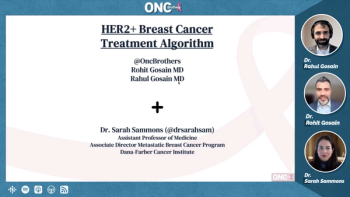
First HER2/4-1BB Bispecific Molecule Shows Clinical Activity in HER2+ Cancers
PRS-343, a HER2/4-1BB targeting bispecific construct, is well-tolerated and demonstrated anti-tumor activity in heavily pre-treated patient population across multiple tumor types.
PRS-343, a HER2/4-1BB targeting bispecific construct, is well-tolerated and demonstrated anti-tumor activity in heavily pre-treated patient population across multiple tumor types, according to data presented from a phase I trial at the 34th Annual Meeting & Pre-Conference Programs of the Society for Immunotherapy of Cancer (SITC 2019).1
The HER2/4-1BB bispecific molecule PRS-343 is designed to activate 4-1BB in a localized manner to provide a safer alternate therapeutic strategy to patients in a broad range of
“As a monotherapy, PRS-343 is well-tolerated with a good safety profile, and has demonstrated anti-tumor activity in heavily pretreated patients across multiple tumor types,” said Geoffrey Y. Ku, medical oncologist at Memorial Sloan Kettering and the principal investigator for the PRS-343 trial.
The ongoing phase I, dose-escalation trial (NCT03330561) has enrolled 53 patients with HER2-positive metastatic solid tumor malignancy who have progressed on standard therapy or for which no standard therapy is available. The patient population is comprised of 19 (36%) with gastric cancer, 14 (26%) with breast cancer, 6 (11%) with gynecological cancers, 5 (9%) with colorectal cancer, 4 (8%) with gallbladder cancer, 2 (4%) with bladder cancer and 3 patients who had either pancreatic cancer, salivary duct cancer, or melanoma.
Twenty-one patients (40%) were heavily pretreated having received ≥5 lines of therapy. For patients with gastric or breast cancer, the median number of anti–HER2 treatments were also high at 2 and 4 lines of therapy, respectively.
“The treatment history, especially the receipt of prior anti–HER2 treatment indicates that this is a 4-1BB mechanism of action,” said Yu.
Eleven monotherapy dose cohorts were evaluated ranging from dose levels from 0.0005 to 8 mg/kg on an every 3-week dosing (Q3W). An additional cohort (11b) received 8 mg/kg once every 2-week dosing (Q2W) schedule with treatment administered on days 1 and 15.
The primary objective of the study is to categorize the toxicity profile and to identify the maximum tolerated dose, as well as identify the recommended phase II dose. Secondary objectives include characterizing the pharmacokinetic profile, investigate dosing schedule, and investigate efficacy.
Safety data for PRS-343 demonstrated that the monotherapy was well-tolerated. Of 111 reported treatment-related adverse events (TRAEs), 10 (9%) cases of infusion-related reactions were reported. Additional reported TRAEs in more than 1 patient included, 7 reported instances of fatigue (9%), and 6 reported instances each of chills, flushing, nausea, diarrhea (6%). Grade 3 TRAEs included 3 instances of flushing, 2 instances of infusion-related reactions, and 1 instance each of fatigue and non-cardiac chest pain. No grade 4 or 5 TRAEs were observed and no patients experienced a dose-limiting toxicity and a maximum tolerated dose has not been reached.
The pharmacokinetics of PRS-343 demonstrated that serum levels of the bispecific construct increase with corresponding dose increases and the mean terminal half-life is approximately 5 days. “[This] is consistent with the half-life of trastuzumab [Herceptin] in other phase I studies,” noted Yu.
Based on pre-clinical and clinical data, a serum concentration of >20 μg/ml was thought to define the active dose level which was demonstrated beginning at cohort 9 with a dose of 2.5 mg/kg, Q3W. Out of 18 evaluable patients, the ORR was 11% with 2 patients having partial response and 8 patients having stable disease. The disease control rate was 55%.1
“It’s interesting that of the 2 confirmed partial responses, both occurred in patients who are receiving treatment at a dose of 8 mg/kg every 2 weeks,” said Yu. Of the 2 patients who achieved a confirmed partial response 1 patient had stage 4 gastric adenocarcinoma and 1 patient had stage 4 gynecological carcinoma.3
Yu also mentioned that the patients treated Q2W in cohort 11b, “seemed to have a longer time on treatment than patients in the lower cohorts.” As of the cutoff date, treatment duration across active dose levels is over 30 weeks.3
Pre- and post-treatment biopsies were obtained from many of the patients after treatment with the second dose. In patients receiving active dose levels and showing clinical benefit reflected a pronounced increase in CD8+ T cell numbers. “Based on these results, future studies are planned to continue development in defined HER2-positive applications,” concluded Yu.
References
1. Piha-Paul S, Bendell J, Tolcher A, et al. Phase 1 dose escalation study of PRS-343, a HER2/4-1BB bispecific molecule, in patients with HER2+ malignancies. Presented at: 34th Annual Meeting & Pre-Conference Programs of the Society for Immunotherapy of Cancer; November 7-10, 2019; National Harbor, MD. LBAO82.
2. Hinner MJ, Aiba RSB, Jaquin TJ. Tumor-localized costimulatory t-cell engagement by the 4-1BB/HER2 bispecific antibody-anticalin fusion PRS-343. Clin Cancer Res. 2019;25(19):5878-5889. doi: 10.1158/1078-0432.CCR-18-3654.
3. Pieris Pharmaceuticals presents data demonstrating monotherapy clinical benefit with 4-1BB/HER2 bispecific PRS-343 in phase 1 escalation study at the Society for Immunotherapy of Cancer (SITC) 2019 Annual Meeting [press release]. Boston, MA: Pieris Pharmaceuticals; November 9, 2019. bit.ly/2Q24R5t. Accessed November 9, 2019.
Newsletter
Stay up to date on recent advances in the multidisciplinary approach to cancer.


































